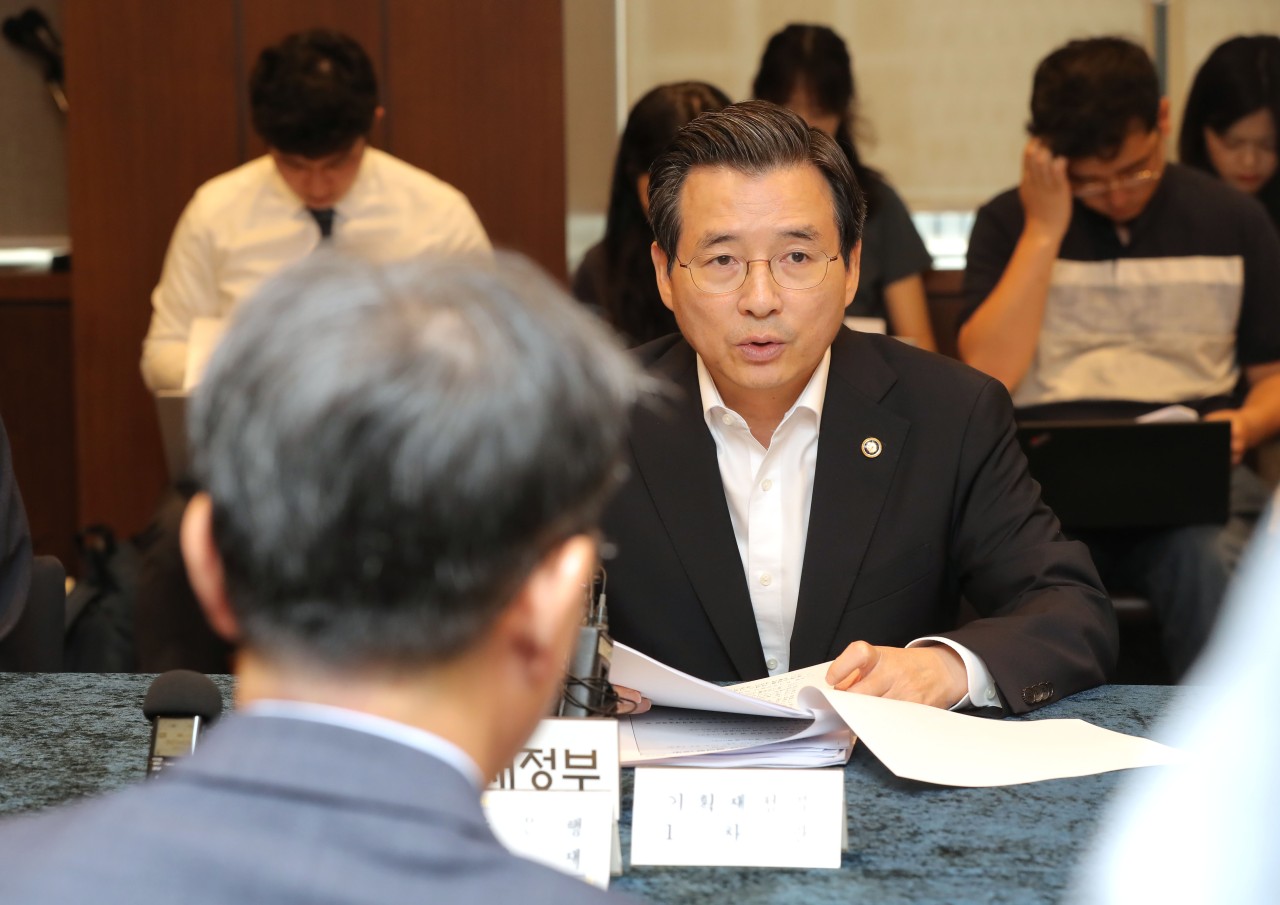Policymakers deny deflation despite negative consumer price growth
Monthly inflation index dips below zero, hits record-low
By Bae HyunjungPublished : Sept. 3, 2019 - 16:45
Inflation in South Korea hit a record low of zero percent in August, with prices remaining unchanged from a year earlier, government data showed Tuesday.
According to Statistics Korea, inflation in August recorded precisely minus 0.038 percent growth from a year earlier, dipping below zero for the first time since the government started to tally such data in 1966.
While the reading was mostly attributed to on-year price falls for agricultural and petroleum products, fiscal and monetary policymakers strived to dispel mounting worries about deflation.
“The on-record price increase rate is rounded off to the nearest tenth (which makes the official figure zero), but this does indicate negative growth in reality,” said Lee Doo-won, the agency’s price statistics director.
The on-year price growth index fell to 0.8 percent in January this year and has remained under the 1 percent mark for eight consecutive months. This is the longest period since 2015 during which the index has stalled in the zero percent range.
According to Statistics Korea, inflation in August recorded precisely minus 0.038 percent growth from a year earlier, dipping below zero for the first time since the government started to tally such data in 1966.
While the reading was mostly attributed to on-year price falls for agricultural and petroleum products, fiscal and monetary policymakers strived to dispel mounting worries about deflation.
“The on-record price increase rate is rounded off to the nearest tenth (which makes the official figure zero), but this does indicate negative growth in reality,” said Lee Doo-won, the agency’s price statistics director.
The on-year price growth index fell to 0.8 percent in January this year and has remained under the 1 percent mark for eight consecutive months. This is the longest period since 2015 during which the index has stalled in the zero percent range.

Responding to the latest data and the public’s concerned reactions, the Ministry of Economy and Finance and the Bank of Korea held an urgent senior officials’ meeting to analyze the low price situation.
“Some have been raising concerns that a slowdown in demand may have led to deflation,” said Kim Yong-beom, first vice minister of finance, in a macroeconomic policy meeting held at the Korea Federation of Banks headquarters in central Seoul.
“(But) the latest low price phenomenon was attributable to supply, rather than demand, and thus does not indicate deflation, which refers to a long-term general decline in prices.”
The senior official cited recent price falls in specific sectors, such as agricultural, fisheries and livestock goods, as well as petroleum.
“Last year, the prices of agricultural, livestock and fisheries goods climbed 4.6 percent (on-year) amid record summer heat, but fell 7.3 percent this year due to (relatively) mild weather,” the vice minister said.
“Had these agricultural, fisheries and livestock goods remained in the conventional price zone, the August consumer price increase would have been in the 1 percent range.”
While prices of petroleum products and agricultural products fell 6.6 percent and 11.4 percent respectively from a year earlier, core inflation -- excluding price-sensitive agricultural and petroleum products -- rose 0.9 percent from a year earlier, data showed.
The BOK’s Senior Deputy Gov. Yoon Myun-shik added that the stalled consumer prices stemmed partly from ongoing changes in the labor market.
““We expect that the current base effect will fade away by year-end and (consumer prices) will recover to the 1 percent range from next year,” Yoon said.
Due to its advanced level of information technology, as well as its aging population, Korea has been especially vulnerable to structural factors such as automation, he explained.
Despite the statements, however, anxiety concerning the economy’s growth prospects lingered as the BOK inched down its quarterly economic growth estimates.
In its preliminary figures on national income, the BOK said the country’s gross domestic product for the second quarter had climbed 1 percent from the previous quarter.
Though this was the highest on-quarter index reading since March 2017, the apparent progress was attributable to the base effect from sluggish growth in January-March. The quarterly figure was also down 1 percent from the BOK’s previous outlook of 1.1 percent.
Under current circumstances, Asia’s fourth-largest economy will have to achieve at least 0.9 percent growth in the third quarter and 1 percent in the fourth quarter if it is to reach its yearly growth target of 2.2 percent.
“The positive factor is that the government will be executing 75 percent of its extra budget within the third quarter (to revitalize the economy),” said a BOK official.
“But considering the downside risks such as the US-China trade dispute and other geopolitical risks, it is yet uncertain how the third-quarter growth pace will turn out.”
Meanwhile, Seoul’s stocks traded slightly lower on Tuesday, reflecting passive investor sentiment here. The benchmark Kospi closed at 1,965.69, down 3.5 points or 0.18 percent from the previous closing.
By Bae Hyun-jung (tellme@heraldcorp.com)







![[KH Explains] How should Korea adjust its trade defenses against Chinese EVs?](http://res.heraldm.com/phpwas/restmb_idxmake.php?idx=644&simg=/content/image/2024/04/15/20240415050562_0.jpg&u=20240415144419)











![[Today’s K-pop] Stray Kids to return soon: report](http://res.heraldm.com/phpwas/restmb_idxmake.php?idx=642&simg=/content/image/2024/04/16/20240416050713_0.jpg&u=)